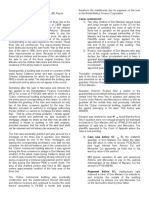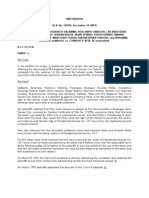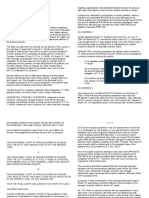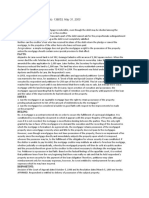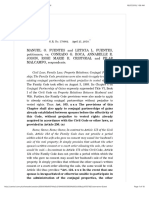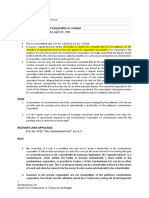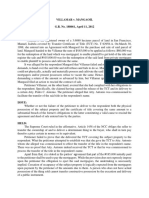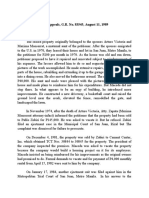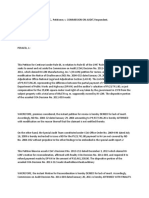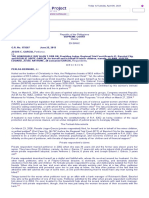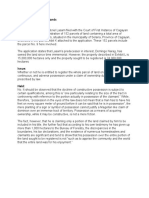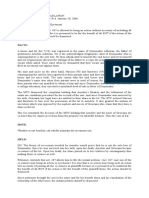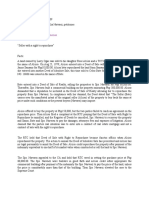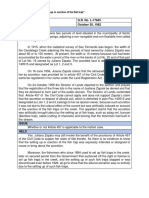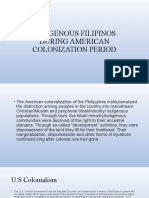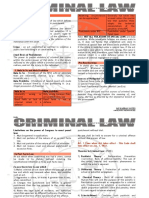0 ratings0% found this document useful (0 votes)
102 viewsMantok Vs Tecson
Mantok Vs Tecson
Uploaded by
Val SanchezThis case involves a dispute over possession of a property between Manotok Realty, Inc. and private respondent Nilo Madlangawa. The trial court originally found Madlangawa to be a builder in good faith and ordered Manotok Realty to pay him P7,500 before regaining possession. When the decision became final, Manotok Realty filed a motion to exercise its option to appropriate improvements and satisfy the judgment, which the respondent judge denied. The Supreme Court held that the trial court decision was already final, so the respondent judge had no basis to deny the motion and should have issued a writ for its execution. Additionally, Madlangawa's good faith ceased after the complaint was filed, so subsequent improvements
Copyright:
© All Rights Reserved
Available Formats
Download as PDF, TXT or read online from Scribd
Mantok Vs Tecson
Mantok Vs Tecson
Uploaded by
Val Sanchez0 ratings0% found this document useful (0 votes)
102 views1 pageThis case involves a dispute over possession of a property between Manotok Realty, Inc. and private respondent Nilo Madlangawa. The trial court originally found Madlangawa to be a builder in good faith and ordered Manotok Realty to pay him P7,500 before regaining possession. When the decision became final, Manotok Realty filed a motion to exercise its option to appropriate improvements and satisfy the judgment, which the respondent judge denied. The Supreme Court held that the trial court decision was already final, so the respondent judge had no basis to deny the motion and should have issued a writ for its execution. Additionally, Madlangawa's good faith ceased after the complaint was filed, so subsequent improvements
Original Description:
digest
Original Title
Mantok vs Tecson
Copyright
© © All Rights Reserved
Available Formats
PDF, TXT or read online from Scribd
Share this document
Did you find this document useful?
Is this content inappropriate?
This case involves a dispute over possession of a property between Manotok Realty, Inc. and private respondent Nilo Madlangawa. The trial court originally found Madlangawa to be a builder in good faith and ordered Manotok Realty to pay him P7,500 before regaining possession. When the decision became final, Manotok Realty filed a motion to exercise its option to appropriate improvements and satisfy the judgment, which the respondent judge denied. The Supreme Court held that the trial court decision was already final, so the respondent judge had no basis to deny the motion and should have issued a writ for its execution. Additionally, Madlangawa's good faith ceased after the complaint was filed, so subsequent improvements
Copyright:
© All Rights Reserved
Available Formats
Download as PDF, TXT or read online from Scribd
Download as pdf or txt
0 ratings0% found this document useful (0 votes)
102 views1 pageMantok Vs Tecson
Mantok Vs Tecson
Uploaded by
Val SanchezThis case involves a dispute over possession of a property between Manotok Realty, Inc. and private respondent Nilo Madlangawa. The trial court originally found Madlangawa to be a builder in good faith and ordered Manotok Realty to pay him P7,500 before regaining possession. When the decision became final, Manotok Realty filed a motion to exercise its option to appropriate improvements and satisfy the judgment, which the respondent judge denied. The Supreme Court held that the trial court decision was already final, so the respondent judge had no basis to deny the motion and should have issued a writ for its execution. Additionally, Madlangawa's good faith ceased after the complaint was filed, so subsequent improvements
Copyright:
© All Rights Reserved
Available Formats
Download as PDF, TXT or read online from Scribd
Download as pdf or txt
You are on page 1of 1
MANOTOK REALTY, INC. vs TECSON, G.R. No.
L-47475 August 19, 1988
Facts:
In a complaint filed by the petitioner for recovery of possession and damages against the
private respondent, the then Court of First Instance of Manila rendered judgment declaring
the defendant Nilo Madlangawa as a builder or possessor in good faith; and ordering the
plaintiff to recognize the right of said defendant to remain in Lot No. 345, Block 1, of the
Clara Tambunting Subdivision until after he shall have been reimbursed by the plaintiff the
sum of P7,500.00, without pronouncement as to costs. Not satisfied with the trial court’s
decision, the petitioner appealed to the Court of Appeals and upon affirmance by the latter of
the decision below, the petitioner elevated its case to this Court which dismissed the case for
lack of merit. The petitioner filed with the trial court, presided over by respondent Judge
Jose H. Tecson, a motion for the approval of petitioner’s exercise of option and for
satisfaction of judgment, praying that the court issue an order: a) approving the exercise of
petitioner’s option to appropriate the improvements introduced by the private respondent on
the property; b) thereafter, private respondent be ordered to deliver possession of the
property in question to the petitioner.
After a denial of its motion for reconsideration, the petitioner filed the present petition for
mandamus alleging that the respondent judge committed grave abuse of discretion in denying
his motion to exercise option and for execution of judgment on the grounds that under
Articles 448 and 546 of the Civil Code, the exercise of option belongs to the owner of the
property, who is the petitioner herein, and that upon finality of judgment, the prevailing
party is entitled, as a matter of right, to its execution which is only a ministerial act on the
part of the respondent judge.
Issue
Should the motion for the approval of the exercise of option be granted?
Held:
Yes. When the decision of the trial court became final and executory, it became incumbent
upon the respondent judge to issue the necessary writ for the execution of the same. There
is, therefore, no basis for the respondent judge to deny the petitioner’s motion to avail of its
option to appropriate the improvements made on its property. To be deemed a builder in good
faith, it is essential that a person assert title to the land on which he builds; i.e., that he be a
possessor in the concept of owner and that he be unaware ‘that there exists in his title or
mode of acquisition any flaw which invalidates it. The private respondent’s good faith ceased
after the filing of the complaint below by the petitioner. Thus, the repairs and improvements
introduced by the said respondents after the complaint was filed cannot be considered to
have been built in good faith, much less, justify the denial of the petitioner’s exercise of
option. Since the improvements have been gutted by fire, and therefore, the basis for private
respondent’s right to retain the premises has already been extinguished without the fault of
the petitioner, there is no other recourse for the private respondent but to vacate the
premises and deliver the same to herein petitioner.
You might also like
- Howard+Luck+Gossage+Collection+ +Legendary+Ads+Vault+ +975042Document109 pagesHoward+Luck+Gossage+Collection+ +Legendary+Ads+Vault+ +975042Guilherme Silvaa100% (2)
- SANGGUNIANG PANLUNGSOD NG BAGUIO vs. JADEWELL PARKING (G.R. No. 160025. April 20, 2005)Document3 pagesSANGGUNIANG PANLUNGSOD NG BAGUIO vs. JADEWELL PARKING (G.R. No. 160025. April 20, 2005)Keenan K Mangiwet67% (3)
- Cacho v. CADocument2 pagesCacho v. CAReymart-Vin MagulianoNo ratings yet
- Case Digest Republic of The Philippines, Petitioner Arcadio Ivan A. Santos, Et - Al., RespondentsDocument1 pageCase Digest Republic of The Philippines, Petitioner Arcadio Ivan A. Santos, Et - Al., RespondentsAra LimNo ratings yet
- Cover Sheet: Company Registration and Monitoring DepartmentDocument1 pageCover Sheet: Company Registration and Monitoring DepartmentNemesio MedinaNo ratings yet
- Political Aspect in The Philippines During The Spanish Colonization PeriodDocument5 pagesPolitical Aspect in The Philippines During The Spanish Colonization PeriodJamie Cuadra88% (33)
- Manotok Realty v. TecsonDocument2 pagesManotok Realty v. TecsonmmgvNo ratings yet
- De Jesus Et Al V Howmart CorpDocument1 pageDe Jesus Et Al V Howmart CorpSyous99No ratings yet
- Title 5 - Possesion A. Rizal Cement Co., Inc v. Villareal 135 SCRA 15Document45 pagesTitle 5 - Possesion A. Rizal Cement Co., Inc v. Villareal 135 SCRA 15Jed CalaloNo ratings yet
- Labor Cases Illegal RecruitmentDocument13 pagesLabor Cases Illegal Recruitmentpaul100% (1)
- Linan Vs PunoDocument2 pagesLinan Vs PunoMichael C. PayumoNo ratings yet
- 3) Bernardo Vs Bataclan DigestDocument3 pages3) Bernardo Vs Bataclan DigesthectorjrNo ratings yet
- Unisource Commercial and Development Corp. Vs Joseph Chung, Et. Al. - GR No. 173252 - July 17, 2009Document3 pagesUnisource Commercial and Development Corp. Vs Joseph Chung, Et. Al. - GR No. 173252 - July 17, 2009BerniceAnneAseñas-ElmacoNo ratings yet
- Alviola V CADocument2 pagesAlviola V CAbatusay575No ratings yet
- Ballatan Vs CADocument5 pagesBallatan Vs CAShe ShoppeNo ratings yet
- Gaboya V CuiDocument2 pagesGaboya V CuiMonalizts D.No ratings yet
- Reyes V MosquedaDocument4 pagesReyes V MosquedaRudejane TanNo ratings yet
- Colegio Medico v. Limpdf PDFDocument1 pageColegio Medico v. Limpdf PDFnilesrevillaNo ratings yet
- Department of Education Culture and Sports Now Department of Education Et Al V Heirs of Regino Banguilan Et AlDocument4 pagesDepartment of Education Culture and Sports Now Department of Education Et Al V Heirs of Regino Banguilan Et AlSanjeev J. SangerNo ratings yet
- Galvan vs. SegundoDocument1 pageGalvan vs. Segundotrizia mae heruelaNo ratings yet
- Dionarto Q. Noblejas v. Italian Maritime Academy Philippines Inc.Document2 pagesDionarto Q. Noblejas v. Italian Maritime Academy Philippines Inc.rafael.louise.roca2244No ratings yet
- Viajar Vs CaDocument1 pageViajar Vs Cavincent gianNo ratings yet
- GR No. L-58469 Case DigestDocument1 pageGR No. L-58469 Case DigestRaym TrabajoNo ratings yet
- Prop DigestDocument9 pagesProp Digestmz rphNo ratings yet
- Tan v. GullasDocument2 pagesTan v. GullasJose Edmundo DayotNo ratings yet
- 1st AssignmentDocument62 pages1st AssignmentbobNo ratings yet
- Doctrine: Equitable Mortgage (Right To Possess)Document2 pagesDoctrine: Equitable Mortgage (Right To Possess)Vaneza LopezNo ratings yet
- Alcantara VS RetaDocument3 pagesAlcantara VS Retacatherinesulapas5673No ratings yet
- 09 Gilliam V Commissioner PDFDocument1 page09 Gilliam V Commissioner PDFBasil MaguigadNo ratings yet
- Bagaipo Case DigestDocument1 pageBagaipo Case DigestChristine Ann ContiNo ratings yet
- de Bogacki Vs InsertoDocument2 pagesde Bogacki Vs InsertoAnn Margaret G. GomezNo ratings yet
- Property Quieting of TitleDocument33 pagesProperty Quieting of TitleCharlie PeinNo ratings yet
- EUSTACIO ATWEL, Et Al. vs. Concepcion Progressive AssociationDocument1 pageEUSTACIO ATWEL, Et Al. vs. Concepcion Progressive AssociationHenri VasquezNo ratings yet
- Liuanag V Yu-SonquianDocument1 pageLiuanag V Yu-SonquianVal SanchezNo ratings yet
- G.R. No. 176492 October 20, 2014 MARIETTA N. BARRIDO, Petitioner, LEONARDO V. NONATO, RespondentDocument3 pagesG.R. No. 176492 October 20, 2014 MARIETTA N. BARRIDO, Petitioner, LEONARDO V. NONATO, RespondentLiza MarieNo ratings yet
- Isaguirre v. de Lara, G.R. No. 138053, May 31, 2000Document1 pageIsaguirre v. de Lara, G.R. No. 138053, May 31, 2000Al Jay Mejos100% (1)
- Buan v. Matugas - DIGESTDocument2 pagesBuan v. Matugas - DIGESTKarez MartinNo ratings yet
- Filipinas Colleges Inc V TimbangDocument2 pagesFilipinas Colleges Inc V TimbangKR ReborosoNo ratings yet
- 17 - Fronda-Baggao V PeopleDocument1 page17 - Fronda-Baggao V PeopleAndrea RioNo ratings yet
- Navy Officers Village Association Inc. Novai Petitioner v. Republic of The Philippines RespondentDocument26 pagesNavy Officers Village Association Inc. Novai Petitioner v. Republic of The Philippines RespondentKobe BullmastiffNo ratings yet
- 2 - Fuentes v. Roca, G.R. No. 178902, 21 April 2010Document18 pages2 - Fuentes v. Roca, G.R. No. 178902, 21 April 2010Karen Dimenkarendimen15No ratings yet
- Sunset v. Campos-DigestDocument2 pagesSunset v. Campos-DigestNina S100% (1)
- METROPOLITAN WATERWORKS AND SEWERAGE SYSTEM Vs CADocument2 pagesMETROPOLITAN WATERWORKS AND SEWERAGE SYSTEM Vs CAmark anthony mansuetoNo ratings yet
- Sales Case Digest Villamar V MangaoilDocument1 pageSales Case Digest Villamar V MangaoilLeeNo ratings yet
- Day 6 - Millado DanDocument13 pagesDay 6 - Millado DanDan R. MilladoNo ratings yet
- Casimiro Development Corporation Vs Mateo (G.R. No. 175485)Document16 pagesCasimiro Development Corporation Vs Mateo (G.R. No. 175485)Rose MadrigalNo ratings yet
- Republic v. East Silverlane RealtyDocument1 pageRepublic v. East Silverlane RealtyHazel P.No ratings yet
- David Vs Malay Property Art 476Document2 pagesDavid Vs Malay Property Art 476demsanpedroNo ratings yet
- Prop 5 - Villarico V SarmientoDocument3 pagesProp 5 - Villarico V SarmientoBelle MaturanNo ratings yet
- IV. LUSTAN Vs CADocument1 pageIV. LUSTAN Vs CAphgmbNo ratings yet
- Judicial Affidavit Assignment For Legal FormsDocument6 pagesJudicial Affidavit Assignment For Legal FormsBernard John ManaligodNo ratings yet
- Visayan Refining Co. v. Camus, G.R. No. L-15870 December 3, 1919Document10 pagesVisayan Refining Co. v. Camus, G.R. No. L-15870 December 3, 1919AB AgostoNo ratings yet
- Land Bank of The Philippines V PerezDocument2 pagesLand Bank of The Philippines V PerezIrish AnnNo ratings yet
- Lot No. 6278-M, A 17,181 Square Meter Parcel of Land Covered by TCT No. T-11397Document3 pagesLot No. 6278-M, A 17,181 Square Meter Parcel of Land Covered by TCT No. T-11397Sonny MorilloNo ratings yet
- Sandejas V LinaDocument6 pagesSandejas V LinaDhin CaragNo ratings yet
- HI-Lon vs. Coa DigestDocument6 pagesHI-Lon vs. Coa DigestAllanjoe TorculasNo ratings yet
- 55-Garcia-vs-CA-GR No 128177Document2 pages55-Garcia-vs-CA-GR No 128177Ronald Alasa-as AtigNo ratings yet
- Case Title G.R. NO. 157150 Ponente Date Doctrine: Bersamin, J.: September 21, 2011Document2 pagesCase Title G.R. NO. 157150 Ponente Date Doctrine: Bersamin, J.: September 21, 2011atNo ratings yet
- Supapo V. Sps. Roberto and Susan DE JESUS, GR No. 198356, 2015-04-20Document5 pagesSupapo V. Sps. Roberto and Susan DE JESUS, GR No. 198356, 2015-04-20Nelia Mae S. VillenaNo ratings yet
- Case Digest - G.R. No. L-175 Damian Ignacio, Francisco Ignacio and Luis Ignacio, PetitionersDocument2 pagesCase Digest - G.R. No. L-175 Damian Ignacio, Francisco Ignacio and Luis Ignacio, PetitionersZapterranosaurusNo ratings yet
- LTD Cases 23-28Document9 pagesLTD Cases 23-28Ramiro Osorio Jr.No ratings yet
- 27 - Lorenzana Vs Cayetano, 78 SCRA 485 (Due Process) v1Document2 pages27 - Lorenzana Vs Cayetano, 78 SCRA 485 (Due Process) v1Faye Jennifer Pascua Perez100% (1)
- Garcia v. DrillonDocument19 pagesGarcia v. DrillonVal SanchezNo ratings yet
- Soria v. Desierto: 153524-25: January 31, 2005: J. Chico-Nazario: Second Division: Decision: January 2005 - Philipppine Supreme Court DecisionsDocument18 pagesSoria v. Desierto: 153524-25: January 31, 2005: J. Chico-Nazario: Second Division: Decision: January 2005 - Philipppine Supreme Court DecisionsVal SanchezNo ratings yet
- Cruz v. Catapang - Case DigestDocument1 pageCruz v. Catapang - Case DigestVal SanchezNo ratings yet
- Nestle Philippines v. PuedanDocument6 pagesNestle Philippines v. PuedanVal SanchezNo ratings yet
- Judge Espanol v. Judge MupasDocument5 pagesJudge Espanol v. Judge MupasVal SanchezNo ratings yet
- Lasam vs. Director of Lands FactsDocument1 pageLasam vs. Director of Lands FactsVal SanchezNo ratings yet
- Spouses Del Campo V AbesiaDocument1 pageSpouses Del Campo V AbesiaVal SanchezNo ratings yet
- Madrid V MapoyDocument1 pageMadrid V MapoyVal SanchezNo ratings yet
- Padilla V VelascoDocument1 pagePadilla V VelascoVal SanchezNo ratings yet
- PLEASANTVILLE Vs CADocument1 pagePLEASANTVILLE Vs CAVal SanchezNo ratings yet
- Case Title: Adlawan V. Adlawan Case Number: G.R. No. 161916. January 20, 2006. Doctrine: Co-Ownership & EjectmentDocument1 pageCase Title: Adlawan V. Adlawan Case Number: G.R. No. 161916. January 20, 2006. Doctrine: Co-Ownership & EjectmentVal SanchezNo ratings yet
- Tecson VS FaustoDocument2 pagesTecson VS FaustoVal SanchezNo ratings yet
- Ortiz V KayananDocument1 pageOrtiz V KayananVal SanchezNo ratings yet
- Phil. Sugar Estates V PoizatDocument1 pagePhil. Sugar Estates V PoizatVal SanchezNo ratings yet
- Narvaez vs. Alciso (Industrial Builder, Plantersower)Document2 pagesNarvaez vs. Alciso (Industrial Builder, Plantersower)Val SanchezNo ratings yet
- Liuanag V Yu-SonquianDocument1 pageLiuanag V Yu-SonquianVal SanchezNo ratings yet
- Case Number:: Case: New Regent Sources, Inc. vs. TanjuatcDocument1 pageCase Number:: Case: New Regent Sources, Inc. vs. TanjuatcVal SanchezNo ratings yet
- 12 Bachrach v. Talisay-SilayDocument2 pages12 Bachrach v. Talisay-SilayVal SanchezNo ratings yet
- 11 Bachrach V SiefertDocument1 page11 Bachrach V SiefertVal SanchezNo ratings yet
- Floreza Vs EvangelistaDocument1 pageFloreza Vs EvangelistaVal SanchezNo ratings yet
- 9 VDA de NAZARENO Vs CADocument1 page9 VDA de NAZARENO Vs CAVal SanchezNo ratings yet
- Ignacio V HilarioDocument1 pageIgnacio V HilarioVal SanchezNo ratings yet
- 8 Zapata V Director of LandsDocument1 page8 Zapata V Director of LandsVal SanchezNo ratings yet
- 3 Victoria V Republic - Case DigestDocument1 page3 Victoria V Republic - Case DigestVal Sanchez100% (1)
- 1 Government Vs Cabangis 53 Phil 112Document2 pages1 Government Vs Cabangis 53 Phil 112Val SanchezNo ratings yet
- 7 Cortes Vs The City of ManilaDocument2 pages7 Cortes Vs The City of ManilaVal SanchezNo ratings yet
- 2 MIAA V CADocument1 page2 MIAA V CAVal SanchezNo ratings yet
- Francisca Taar Et. Al. V Claudio Lawan Et. Al.Document3 pagesFrancisca Taar Et. Al. V Claudio Lawan Et. Al.rafael.louise.roca2244No ratings yet
- Frederico Olbes v. Hon. Buemio (Speedy Trial) PDFDocument11 pagesFrederico Olbes v. Hon. Buemio (Speedy Trial) PDFDana Mae TadeaNo ratings yet
- Rosales Balm105 1Document4 pagesRosales Balm105 1Allyssa Melan RosalesNo ratings yet
- Tutorial Week 10 Law309 (DP)Document4 pagesTutorial Week 10 Law309 (DP)AlNo ratings yet
- Elements of A Decree 2 (2) of CPCDocument6 pagesElements of A Decree 2 (2) of CPCNidhi GuptaNo ratings yet
- Affidavit - Mrs S Kistnen - 21 DecDocument3 pagesAffidavit - Mrs S Kistnen - 21 DecL'express Maurice100% (1)
- BROCHURE Mock Parliamentary DebateDocument11 pagesBROCHURE Mock Parliamentary DebatesriprasadNo ratings yet
- Government of USA Vs PurgananDocument3 pagesGovernment of USA Vs PurgananChristina AureNo ratings yet
- State of MN V Don Mashak Appellate RCAPForm 133 Statement of Case 14-1425Document10 pagesState of MN V Don Mashak Appellate RCAPForm 133 Statement of Case 14-1425Don MashakNo ratings yet
- Announcement For Spring 2020 YSEALI Academic FellowshipDocument3 pagesAnnouncement For Spring 2020 YSEALI Academic FellowshipAldiAldinarNo ratings yet
- Problem Areas in Legal Ethics Midterm TopicsDocument7 pagesProblem Areas in Legal Ethics Midterm TopicsCayen Cervancia Cabiguen100% (2)
- San Beda College-Manila College of Law General PrinciplesDocument19 pagesSan Beda College-Manila College of Law General Principlesttyr4No ratings yet
- Iidika Visitors 1655966135716Document14 pagesIidika Visitors 1655966135716Arnab GhosalNo ratings yet
- Moot MemorialDocument8 pagesMoot MemorialNikita GuptaNo ratings yet
- Lobbying Isn't Dying (Instead, It's Simply Going Underground) by Vidhya Nagarajan (For The Investigative Fund at The Nation Institute)Document1 pageLobbying Isn't Dying (Instead, It's Simply Going Underground) by Vidhya Nagarajan (For The Investigative Fund at The Nation Institute)Anonymous yu09qxYCMNo ratings yet
- Laguna Lake Development Authority Vs CA, Serapio, AsistioDocument7 pagesLaguna Lake Development Authority Vs CA, Serapio, AsistioSachuzenNo ratings yet
- Brioso V Mariano - GR 132765Document7 pagesBrioso V Mariano - GR 132765Jeremiah ReynaldoNo ratings yet
- Affidavit of DesistanceDocument3 pagesAffidavit of Desistancedempearl2315No ratings yet
- G.R. No. L-39110 November 28, 1933Document6 pagesG.R. No. L-39110 November 28, 1933Iris Jianne MataNo ratings yet
- Assignment FinalDocument26 pagesAssignment FinalSohel Sardar100% (2)
- Erika Xim Paola Santos BSBA (Marketing) - III BA 170 - 4Document4 pagesErika Xim Paola Santos BSBA (Marketing) - III BA 170 - 4XimPao SaintNo ratings yet
- Ujsportal - Pacourts.us DocketSheets CourtSummaryReportDocument4 pagesUjsportal - Pacourts.us DocketSheets CourtSummaryReportmjguarigliaNo ratings yet
- Indigenous Filipinos During American Colonization PeriodDocument5 pagesIndigenous Filipinos During American Colonization PeriodHowell AragonNo ratings yet
- Criminal Law 1 MKP Notes.v03Document123 pagesCriminal Law 1 MKP Notes.v03ALAYSHA ALI100% (1)
- Eo BDRRMCDocument6 pagesEo BDRRMCAgustin MharieNo ratings yet
- Source: Newspaper Association of America (Estimates) (Estimates) (Estimates)Document6 pagesSource: Newspaper Association of America (Estimates) (Estimates) (Estimates)eugene.s.lin298No ratings yet
- TerrorismDocument20 pagesTerrorismLily YliaNo ratings yet
- Kina SukobiDocument25 pagesKina SukobiMilos JankovicNo ratings yet















